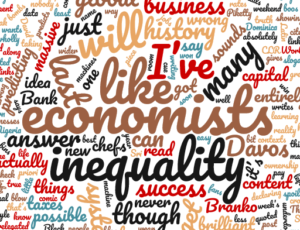Hi all,
So, I’ve just spent the last few minutes following Donald Trump’s speech at Davos. There’s a section of the global audience who will slam what he says regardless of the content and style, but it wasn’t the train wreck some were predicting (though he did get comic book boos and hisses for an attack on the media). Regardless, it’s incredibly striking how different in tone and content it was to Xi Jinping’s keynote last year, and it really is both remarkable and not fully internalised in our own geopolitical analyses how much the roles and attitudes towards the global economic system traditionally held by the US and China have reversed. It’s a bit like Sri Lanka showing up to an ODI final against Bangladesh as massive underdogs, but less depressing.
- Speaking of Davos, Branko Milanovic is a sceptic. Starting with Euripedes, he laments that the quickness with which the Davos crowd will speak of inequality (and right on cue, in the post-Trump session, Christine Lagarde has just cited inequality as one of the key threats to the global economy) is matched by their silence and inaction when it comes to seriously considering international capital mobility, the revival of monopoly power and restrictions on labour organisation and how these have contributed to it. Michael Clemens might add migration to that list of wilful blindness, here again advocating for a serious hearing of the Global Skills Partnerships
- Branko, of course, thinks more deeply and carefully about inequality than most. And in an interview with Cardiff Garcia (I will never get tired of typing his name) and Stacey Vanek Smith (transcript), he compares most contemporary analysis of how inequality can be tackled to a general trying to win a new war with the tactics that won the last. But the combatants are different, they have organised differently and they are fighting on an entirely new terrain. In what sense will traditional unionism be the answer in a world where outsourcing makes firm-level inequality insignificant compared to between-firm inequality? Can domestic taxes be an answer when the rich can pick and choose where to pay their taxes? His answer, which will please Piketty fans, is wider ownership of capital.
- This is absolutely brilliant, the best piece of writing in this week’s links: Gabrielle Bedot writes about Haiti, declaring it to be “nobody’s shithole”, along the way giving a little history of Haiti and Dominica and the history of vilifying them (she gives a shout-out, too, to CLR James’ The Black Jacobins, one of the most stirring books of history I’ve read). Everyone should read this.
- A brilliant blog by David McKenzie, comparing the success rates of business people, economists and a machine learning system in predicting business success a priori. It turns out that the machines are not taking these jobs any time soon: the reality is that no system predicts business success well, at least in contexts like Nigeria, where virtually all businesses face massive challenges.
- Washington, DC has too many economists and not enough chefs. I know that sounds like the start of a joke about how too many economists spoils the broth, but it’s actually just the empirical truth: there are more economists in DC than chefs. This sounds entirely wrong for a happy society (though I am informed that it is possible to get spectacular Latin American food in DC, so all is not lost).
- I can’t believe I’ve relegated this to the last link, but it turns out that it is possible to throw so many stink bombs you can no longer stay in the room: Paul Romer has left his post as Chief Economist of the World Bank. I’ve got to say, he wasn’t wholly wrong about a few of the things he wanted to blow up, but the e-mails quoted in the FT are… interesting: “I’ve never in my professional life encountered professional economists who say so many things that are easy to check and turn out not to be true”. He clarifies to the FT that he doesn’t actually think the Bank have been fabricating data for research, but that’s not a clarification anyone wants to have to make. I do like the idea of an Internal Justice Bureau, though, is it like a Justice League for economists? If so, I’ve got a slogan I’d like them to consider: ‘Not all economists wear capes’.
Have a great weekend, everyone!
R

